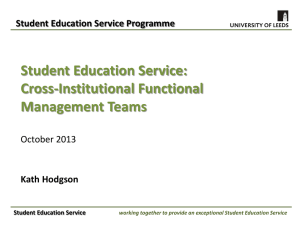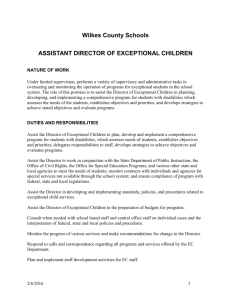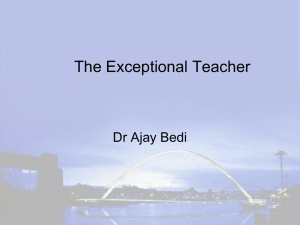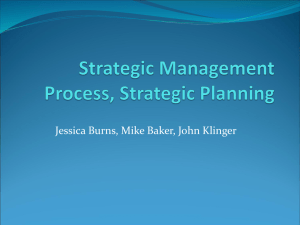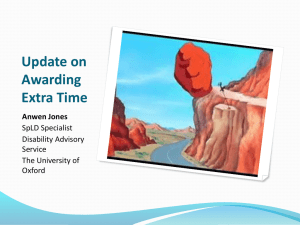POLICE OMBUDSMAN FOR NORTHERN IRELAND Policy in
advertisement
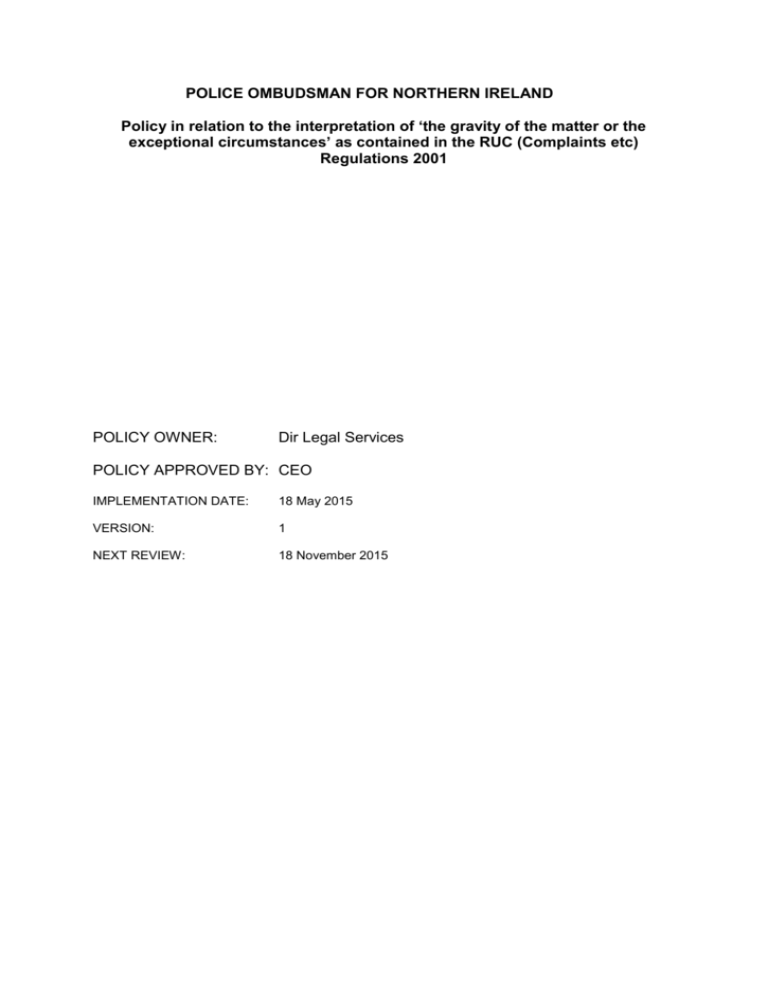
POLICE OMBUDSMAN FOR NORTHERN IRELAND Policy in relation to the interpretation of ‘the gravity of the matter or the exceptional circumstances’ as contained in the RUC (Complaints etc) Regulations 2001 POLICY OWNER: Dir Legal Services POLICY APPROVED BY: CEO IMPLEMENTATION DATE: 18 May 2015 VERSION: 1 NEXT REVIEW: 18 November 2015 The Police Ombudsman for Northern Ireland Policy in relation to the interpretation of ‘the gravity of the matter or the exceptional circumstances’ as contained in the RUC (Complaints etc) Regulations 2001 Introduction 1. The Ombudsman has discretion to deal with public complaints which are made outside the usual time limit, namely 12 months after the conduct of the member concerned. In order to ensure some consistency in approach across the organisation, the following guidance is being issued to assist in the interpretation of what we understand to be meant by the phrase “should be investigated because of the gravity of the matter or the exceptional circumstances” as used in the relevant parts of the RUC (Complaints etc) Regulations 2001 (‘the 2001 Regulations’), and how that will generally be approached by the Office. 2. Given that the Office was established to ensure that both the public and police can have present and ongoing confidence in the police complaints system, I consider that the more distant the allegations made against the police, the more grave or exceptional the matter will need to be before I consider that it should be investigated. 3. This guidance should be read only as guidance. It is not binding and each case will need to be assessed on its individual merits. Although designed to promote consistency, this guidance should not be followed slavishly. Every case will be different. Where there is any doubt as to whether the matter should be within remit, then it should be escalated accordingly for further consideration. History Directorate 4. The History Directorate examines allegations of criminal/disciplinary misconduct alleged against members of the RUC between 1968 and 1998. If a complaint is made by a member of the public and the other qualifying criteria set out in the relevant parts of the 2001 Regulations apply, then the following is a guide as to what should be considered as sufficiently ‘grave or exceptional’ so that the matter should be investigated. 5. These issues are to be considered in the context of policing during the relevant period; and in the context of priority generally being given to ensuring that the oversight of the current police service is efficient and effective, particularly given the limited resources available to the Office. 6. ‘The gravity of the matter’ in the context of historical cases will normally, but not exclusively, involve an allegation of RUC involvement in the death of a person, whether by direct or indirect involvement, or in some circumstances as a result of a failure on their part to effectively investigate a death. It may also be the case that, although not involved in a death, the allegations against officers involve such a widespread and consistent element of criminality that, in all the circumstances, it is grave in the historical context. 7. Furthermore, if the test of gravity is not met, it should nonetheless be considered if ‘the exceptional circumstances’ of the case are such as to make it appropriate to investigate the matter. By definition, it is difficult to define in advance what exceptional circumstances will be. However, I believe that what is exceptional, in historic cases, would include high profile matters and matters of national importance. Again, if there is any doubt then the matter should be escalated. Each case must be examined on its own merits. Current Directorate 8. The Current Directorate deals with all matters post-dating the Good Friday Agreement (10 April 1998). It, therefore, will have remit over certain RUC matters (11 April 1998 to 3 November 2001). The test in dealing with such allegations will be similar to that in relation to the History Directorate, described above, given that such matters are of some vintage and relate to the previous police force (albeit that force was incorporated into the PSNI). 9. The test for whether a matter is sufficiently ‘grave or exceptional’ that it should be investigated in relation to matters concerning members of the PSNI should be a less stringent one in my belief. There are a number of reasons for this general policy approach. Given that this Office was established to ensure that everyone can have confidence in the police complaints system relating to the ‘new’ police force, it is important that the most serious allegations can be investigated without an overlyprescriptive time limit. Moreover, in more recent cases (post-dating 2001) there is generally likely to be fewer investigative difficulties than in relation to older cases and there is also a greater likelihood that the officers concerned may still be serving. 10. However, each individual case must be considered on its own merits and where there is doubt as to the gravity of the matter, it should be escalated. As a guide to the application of the ‘grave or exceptional’ test in current cases, the following should act as a starting point. The case will merit investigation where the complaint relates to the following: a. The conduct of a relevant member led to the death or serious injury of a member of the public. ‘Serious injury’ shall be one as defined by section 50 of the Act; b. A relevant member committed (or attempted) a serious assault or serious sexual offence; c. A relevant member is guilty of serious corruption; d. Any other complaint which raises an issue of significant public interest. As discussed above, the more recent the matter/circumstances giving rise to the complaint, the more likely that it will be that it is considered sufficiently ‘grave or exceptional’ that it should be investigated. 11. As noted at paragraph 7 above, if the test of gravity is not met, it should nonetheless be considered if ‘the exceptional circumstances’ of the case are such as to make it appropriate to investigate the matter. A further consideration as to whether the matter is ‘exceptional’ relates to how long the complainant has been aware of the misconduct alleged and when they could or should reasonably have been aware of same. There may be circumstances where the complainant only becomes aware of the misconduct after the 12 month time limit has expired. In those circumstances, depending on how long thereafter the complainant contacts the Office, this may be a relevant factor in making a decision. Conclusion 12. This guidance should be considered as a guide only, which can and should be departed from in appropriate circumstances. Each and every case will be different and must be assessed on its own merits. When it becomes clear that the conduct complained of occurred outside the 12 month time limit, the complainant should be provided with a copy of this policy and asked if he or she wishes to make any representations (within 21 days) as to why he or she believes that it does come within one or both of the categories and so ought to be investigated. 13. It is of importance to also consider the rights of the members of the PSNI under relevant legislation. 14. I have considerable discretion as to what I believe to be ‘the gravity of the matter or the exceptional circumstances’ and whether they mean that the complaint should be investigated; and I wish to ensure that there is a consistency in decision-making on these issues whilst also recognising that no two cases are ever the same. Dr Michael Maguire Police Ombudsman for Northern Ireland

